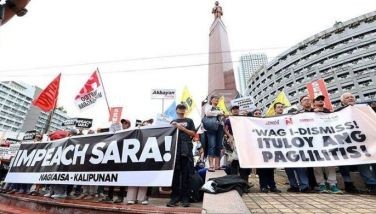POEA issues medical alert on MERS, polio
MANILA, Philippines - Overseas Filipino workers (OFWs) were issued yesterday a medical alert on the Middle East Respiratory Syndrome-coronavirus (MERS-CoV) and polio.
Administrator Hans Leo Cacdac of the Philippine Overseas Employment Administration (POEA) urged all licensed recruitment agencies to have their returning/vacationing workers from the Middle East undergo MERS-CoV testing.
It should be at no cost to the workers, he added.
The POEA has strongly advised OFWs to undergo anti-polio vaccination before departing the Philippines at Department of Health (DOH)-accredited hospitals and clinics.
The World Health Organization (WHO) had sounded the alarm over polio spreading from Afghanistan, Nigeria and Pakistan to 10 other countries, including Somalia, Cameroon, Syria, Equatorial Guinea, Ethiopia and Israel.
The DOH said Filipinos going to these 10 countries must undergo anti-polio vaccination prior to their departure.
DOH Family Health Office acting director Joyce Ducusin said the vaccination will help keep the virus at bay.
In 2000, the WHO declared the Philippines polio-free since the last recorded case was in 1993.
Ducusin assured the public that the DOH will initially provide free vaccines to the Bureau of Quarantine (BoQ).
“The vaccination, however, will have to be done four weeks prior to departure date because it takes this period for the vaccines to take effect,†she said.
Ducusin is also the DOH program manager for Expanded Program on Immunization.
The DOH is working with the Department of Foreign Affairs (DFA) to have OFWs coming from the 10 polio-affected countries vaccinated before flying home.
For travelers in war-torn nations where the health system might be dysfunctional, vaccination booths can be placed at airports so they can be immunized upon arrival.
The WHO has issued an eight-point guideline to help member-states in combating MERS-CoV.
In a statement, WHO has “strongly urged†countries to take immediate steps to “improve national policies for infection prevention and control, and implement them in health-care facilities.â€
The WHO said countries should also “initiate and accelerate critical investigations, including case-control, serological, environmental and animal studies, to better understand the epidemiology, especially risk factors, and assess the effectiveness of control measures.â€
Other recommendations are:
• Support countries that are particularly vulnerable, especially in sub-Saharan Africa, taking into account the regional challenges;
• Strengthen case and contact identification and management;
• Greatly enhance awareness and effective risk communication concerning MERS-CoV to the general public, health professionals, at-risk groups, and policy makers;
• Strengthen inter-sectoral collaboration and information sharing across ministries and with relevant international organizations, especially with the World Organization for Animal Health (OIE) and the Food and Agriculture Organization of the United Nations (FAO);
• Develop and disseminate advice regarding mass gatherings to prevent further spread of MERS-CoV; and
• Share information in a timely manner with WHO, in accordance with the 2005 International Health Regulations (IHR).
The guidelines are a product of the Fifth Meeting of the IHR Emergency Committee concerning MERS-CoV held recently.
- Latest
- Trending
































